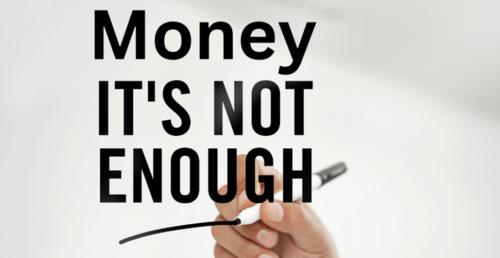
What are the absolutely Essential Ingredients for being a Successful Entrepreneur?
(2).png)
If you've ever spent time around kids, you've been subjected to a barrage of the most classic of childhood queries: "Why?"
Even from a young age, we know intuitively that the motive behind an action is the most important piece of any story. When it comes to your business -- whether you've already launched or if you're still in the whiteboard phase -- knowing your "why" will help you stay committed to your dream and help others get on board, too.
What are the absolutely essential ingredients for being a successful entrepreneur? To me, assuming someone has even a base level of talent, a person's desire to run a business would be the most important factor to their success. It sounds so simple, but if someone has a strong "why" behind what they do, there is an almost unstoppable life force that will propel them.
The world seems to be organized around the power of purpose. Napoleon Hill wrote about this in his book Think and Grow Rich. Basically, the stronger your why, the better your chances are at being successful.
If you start a business, there will be inevitable and serious setbacks to your success. So, you need overwhelming drive, which comes from a sense of purpose.
But where does the why come from? Usually, it comes from either some kind of deficit in your life that you want to overcome or from a deep desire to serve others through rendering your product or service. Therefore, it seems paradoxical to me that someone's why can come from something negative (a deficit of some kind) or something positive (a desire to serve).
I suppose there can also be a combination of the two. I think if we were really honest, many of us would recognize that we are at least partially trying to fill in some holes in our lives by being entrepreneurs.
I don't like to label a whole population of people around their motives, but many people who have been judicially involved are trying to fill a hole in their lives. By the way, these holes are not always mindsets or psychological ones. They can be, for example, a desire for enough money to adequately provide for a family.
A lack of money and everything attached to that is a profound motivator for most people who live in scarcity.
However, I believe that most entrepreneurs are filling deeper holes than economic ones. They usually have some kind of chip on their shoulder or something in their life that they want to prove or disprove.
I wonder, what is the greater motivational force--trying to make up for what you don't have or trying to complete some higher purpose? Eight-time Grand Slam champion Andre Agassi pointed out the truth about this higher purpose I'm talking about. He said, "Remember this. Hold on to this. This is the only perfection there is--the perfection of helping others. This is the only thing we can do that has any lasting meaning. This is why we're here."
To me, he was pointing out the need to create something bigger than ourselves. In this way, if I have to guess, the motivation to serve other people probably outweighs the need to fill a personal hole. Of course, this has limits because people have different sizes of holes.
The most important thing to convey is that you should not start a business without a very strong purpose, because starting a business takes grit and nerves.
What will get you through the long nights isn't the promise of flashy success or a lot of money, but rather, being reminded that you are creating something bigger than yourself.
How do you know what that is? Ask yourself these two questions. Number one, what would I do for free? And number two, what am I doing to uplift others around me? The first question should point you toward what you're passionate about, and the second one pushes you to turn that passion into purpose. Your purpose will sustain you in the long run--so go find it.

"The siren call for many entrepreneurs isn't money, it's freedom. The freedom to chart your own path, the freedom to build what you want with the people you love." -- Andrew Wilkinson, Founder of MetaLab and Flow
As the owner of your company, you can set your own targets and standards. And while the freedom of not having anyone standing in your way can be invigorating, the stress of knowing there is no one to blame for any failures can be too much to bear. This is when your "why" becomes imperative.
If you aren't 100 percent committed to making your vision a reality, you won't be impassioned enough to nurture your business through its inevitable growing pains. Businesses rarely make money right off the bat, so the dream of money alone will not be reason enough to see it through. Don't trade in the shackles of your corporate day job for a gilded cubicle of your own making.
If a paycheck is just a means to end, how do you know when you've reached it? Is it after five years? 10? Or when you finally make a down payment on a house? The more material possessions you acquire -- a car, a house, that timeshare in Vermont -- the more that steady, safe paycheck becomes a crutch. So ask yourself, "Why am I doing this?"
Once you find an answer that speaks to your soul, the next question should be, "What am I waiting for?"

"You can only become truly accomplished at something you love. Don't make money your goal. Instead pursue the things you love doing, and then do them so well that people can't take their eyes off of you." -- Maya Angelou
The great thing about passion is that it's infectious. And a great story doesn't have to be dramatic, just genuine. One of my favorite branding stories of all time is for a product called Solar Recover. I believe the story on the back of the bottle used words like "nuked all day in the sun" and "scaly lizard" to explain the need that drove them to create their product.
If you visit their website, they even admit to intentionally burning themselves so they could test out their product and leave samples at the hotels where they were staying. Now that's commitment.
With so many social marketing campaigns, customers want to feel like they are supporting a cause, not just buying a product. If your audience knows that you love what you do, not only will they be more confident that you've made the best possible product, they'll want to support your enthusiasm by giving you their business.
Your story is also your link to your core principles. If you set out to make a product with all natural ingredients, keep that in mind as your business begins to grow. Don't compromise the integrity of your product or you'll undermine your customer's trust and everything you've accomplished.
Perhaps you love yoga and your friends are always saying you should become an instructor. That's great if you really enjoy the idea of teaching others. But if the reason you like yoga is because it allows you a quiet escape from the rest of the world, then there's nothing wrong with keeping it all to yourself.

"There is no passion to be found playing small -- in settling for a life that is less than the one you are capable of living." -- Nelson Mandela
Do some market research. Poll your closest friends and family (only people you trust to give you an honest answer) and ask them what they think your strengths are. Not only can it be a huge confidence booster to hear how wonderful they think you are, but they may come up with skills you didn't even realize you had.
Another thing is to ask yourself what sorts of things people ask you for help with. Does your tech savvy make you the first person people call when they're thinking of buying a new computer? Do you frequently help family members write letters or improve their résumés? Maybe you are the best at finding great airline deals or your broad perspective means people consult your opinion before making a big financial decision.
Whatever it is, think about those things you do for free and extrapolate out to see where a potential business could be born.
Another simple yet powerful exercise is to follow the advice of American self-help author, Steve Pavlina. He says to get a piece of paper and ask yourself, "What's my purpose in life?" Write down an answer. Write another one and keep writing answers until one of them makes you cry. That's your purpose.
Lastly, keep in mind these words from Marie Forleo, host and founder of MarieTV: "Clarity comes from engagement, not thought." While visualization is great, it can only take you so far. Dreaming of smelling the ocean as you write your novel in Cape Cod may have sounded great -- except you forgot about all those flies.
I once heard of a young ophthalmologist who had to change careers because she couldn't stand being so close to people's faces all day. It sounds ridiculous, but there are some aspects of reality that visualization just won't cover. You owe it to yourself to get out there and start doing what it is you say you want to do. If it truly is your passion, getting your feet wet will only solidify your resolve and make the transition to becoming a professional that much easier.

When your enthusiasm is palpable, people want a ticket on your happy train. The key to harnessing that passion is understanding your "why." Why are you passionate about windsurfing? Is it because it helped you lose 30 lbs, get off all your medications and have a new lease on life?
Markethive - a Powerful Ecosystem for Entrepreneurs
MarketHive is an entrepreneurial social marketing platform with the combined strength of LinkedIn, Amazon, Facebook and Marketo.
Markethive is at the forefront of marketing in today's online environment.
It's the perfect marketing platform for online marketers, businesses, affiliate marketers, brands, cryptocurrency enthusiasts, investors and anyone else that requires an online presence.
More info HERE <<<<
About: Andries vanTonder
Over 40 years selfemployed
He is a Serial Entrepreneur, an Enthusiastic supporter of Blockchain Technology and a Cryptocurrency Investor
Find me at my Markethive Profile Page | My Twitter Account | My Instagram Acount | and my Facebook Profile.
